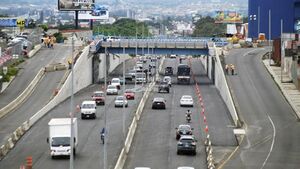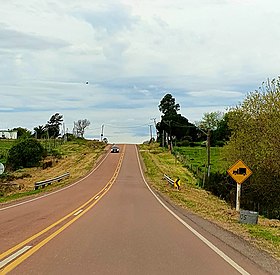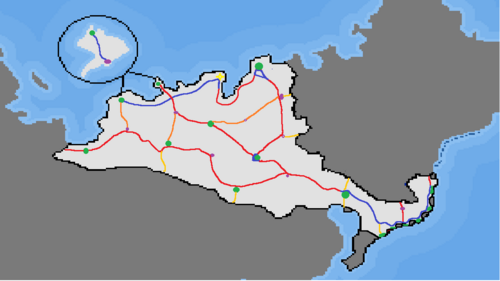Rosaliart: Difference between revisions
No edit summary |
No edit summary |
||
| (5 intermediate revisions by the same user not shown) | |||
| Line 1: | Line 1: | ||
{{Infobox country | {{Infobox country | ||
|conventional_long_name = Kingdom of Rosaliart | |conventional_long_name = Kingdom of Rosaliart | ||
|native_name = | |native_name = |Oneiro xa Rosaliart | ||
|common_name = Rosaliart | |common_name = Rosaliart | ||
|image_flag = File:Rosalian Flag.png | |image_flag = File:Rosalian Flag.png | ||
| Line 39: | Line 39: | ||
|GDP_nominal_year = 2023 | |GDP_nominal_year = 2023 | ||
|GDP_nominal_per_capita = 9,500 ACU | |GDP_nominal_per_capita = 9,500 ACU | ||
|GDP_PPP = $266,600,000,000 ACU | |||
|GDP_PPP_year = 2023 | |||
|GDP_PPP_per_capita = 12,400 ACU | |||
|sovereignty_type = | |sovereignty_type = | ||
|established_event1 = | |established_event1 = | ||
| Line 46: | Line 49: | ||
|HDI_year = 2023 | |HDI_year = 2023 | ||
|HDI_change = increase <!--increase/decrease/steady--> | |HDI_change = increase <!--increase/decrease/steady--> | ||
|HDI = 0. | |HDI = 0.783 <!--number only--> | ||
|HDI_ref = | |HDI_ref = | ||
|HDI_rank = | |HDI_rank = | ||
| Line 125: | Line 128: | ||
[[File:Ring road of Santander.jpg|300px|thumb|left]] | [[File:Ring road of Santander.jpg|300px|thumb|left]] | ||
[[File:Road in the interior.jpg|thumb]] | [[File:Road in the interior.jpg|thumb]] | ||
[[File:Road map.png|500px|frameless]] | |||
==Demographics== | |||
===Healthcare=== | |||
In 2023, life expectancy stands at 75 years, being shorter than that of most Anteria countries. However, there has been a significant jump compared to the year 2000, in which life expectancy stood at 71 years. Infant mortality stands at 9 deaths per 1,000 live births. Approximately 25% of the population suffers from overweight and 5% from obesity. This is due to the worsening of the country's food quality due to the entry of fast food companies. In addition, the consumption of processed food has risen a lot in the last decade. The adolescent pregnancy rate is 30 per 1,000 women. Abortion was legalized in 2017 for cases of rape, risk to the life of the woman, or risk to health. It is not allowed to abort due to bad socioeconomic conditions or of their own free will, being sentenced to 3 years in prison. | |||
Government spending on health stands at 7%. The health of the country is among one of the cheapest in the region, with a per capita cost of 868 ACU per person. | |||
The country's medical centers have greatly improved in the last century, adapting to most international standards. 95% of medical institutions are privately owned, although they have some government subsidies. Most of the hospitals are owned by large companies and medical schools. The best quality hospitals in the country are the Xamerio Hospital and the Riola Medical Center, located in the country's capital. | |||
Health coverage in the country is not universal, and works through a private health insurance system. Healthcare is quite expensive for the majority of citizens because there is no type of price regulation for medicines or treatments. There are more than 700 different insurances in the country, which offer different types of coverage, copayments and services. Approximately 21% of the population lacks some medical coverage, and 5% has poor insurance. This is estimated to cause 500 deaths a year. | |||
The government has taken certain measures in the last five years to expand healthcare access in the country. For example, it has been prohibited to discriminate against people based on age, gender and diseases when it comes to receiving insurance. Tax deductions are also offered to companies that offer health insurance to their workers. | |||
==Foreign Relations== | ==Foreign Relations== | ||
==Notable Figures== | ==Notable Figures== | ||
Latest revision as of 21:47, 14 January 2023
Kingdom of Rosaliart | |
|---|---|
|
Flag | |
| Motto: "Hirto ou Mort" (Spanish) "Honor or Death" | |
| Capital and largest city | Santander |
| Official languages |
|
| Demonym(s) | Rosalian |
| Government | Unitary semi-constitutional monarchy |
• King | Loise Feixôs II |
| Legislature | Parliament |
| National Assembly | |
| Population | |
• 2023 census | 21,5M (2023 census) |
| GDP (PPP) | 2023 estimate |
• Total | $266,600,000,000 ACU |
• Per capita | 12,400 ACU |
| GDP (nominal) | 2023 estimate |
• Total | $204,250,000,000 ACU |
• Per capita | 9,500 ACU |
| Gini (2023) | medium |
| HDI (2023) | high |
| Currency | Rosalian Pound |
| Time zone | UTC+4 |
| Driving side | left |
| Internet TLD | .ros |
The Kingdom of Rosaliart is a sovereign country located in the eastern part of the island of Meredonne. It shares a border to the east with the country of Hylia. The national territory is made up of 13 duchies. In turn, each duchy is divided into counties. The capital city is Santander, located in the north of the country. The official language is Rosalian.
History
Geography
Culture
Peoples
Music
Cuisine
Military
Economy
Rosaliart has a free market capitalist mixed economy. With a median economy with a GDP of $204,250,000,000 ACU and a GDP per capita of 9,500 ACU, it is considered a developing country. The main sectors of the country are the timber industry, intensive livestock farming and agriculture. In recent years, an important financial sector and the food industry are also emerging. Rosaliart is characterized by having a low Corporate Tax (between 5 and 15%), and a medium personal tax rate (between 10 and 30% depending on income). The government has little weight in the economy, representing only 3% of it.
It has very weak labor and economic regulations, which allow for a free market with a high rate of economic freedom. Public debt is at 15%, being one of the lowest in Anteria. There is a great difference in economic development between the coast (especially the northwest and southeast areas of the country) and the interior. While the capital Santander reaches a GDP per capita of $45,000, there are regions where it barely reaches $2,500.
Government
Rosaliart is defined as a unitary semi-constitutional monarchy in the Constitution. The head of state is the king, and performs certain functions. There is a certain separation of powers, and the institutions enjoy considerable independence.
Parliament
The legislative power is exercised by the parliament (Hasambrea in Rosalian). The Hasambrea is made up of 140 members, who are voted in every 5 years by all people over 21 years of age, with a stable job and no criminal record.
The voting method is as follows: each duchy has 6 representatives, and the free counties have 2 each. First, a first round of elections is held, in which all parties are eliminated except the three with the most votes (2 in the case of free counties). Subsequently, a second round is held, in which the party with the most votes will have 3 seats, the second 2 and the third 1. In the free counties, one of the parties must reach 60% of the votes to take the 2 seats. If not, these will be distributed equally. In this way, 70 parliament seats are distributed. The remaining 70 are distributed based on the percentage of the total vote of each party in the country in the first round of elections.
Once the parliament is formed, a party or alliance of parties must have at least 75 seats in parliament to be able to govern with an absolute majority. The prime minister will be the leader of the winning political party. The day after the appointment of the prime minister, he must meet with the king. There, he must speak with him and swear allegiance to the country.
In the event that a government with an absolute majority is not formed within a period of a year and a half, the king can authorize (if he wants) that the party with the most votes can govern with a simple majority. In the event that this occurs, the prime minister may only govern for one term, and must retire from office in the following elections.
The executive power
Executive power is shared by the prime minister and the king. It is in charge of applying the laws passed in Parliament. He also has the power to create decrees. These are laws that do not require a vote in parliament, and are in effect until the next elections. In case there is too much political instability, the king and the prime minister can dissolve parliament if they wish.
The Justice
Justice depends on the Supreme Court of the Nation. There is a delegation of this court in each duchy of the country; where the trials will be held. The Supreme Court is made up of 12 members appointed by the king and the prime minister, who can remain in office for a maximum of fifteen years.
The maximum law applied is the Constitution. In the event that what is specified is not included, different amendments published over the years by Parliament will be taken into account. If the King wants, he can pardon a prisoner.
The country's penal code is characterized by being harsh and intransigent. The death penalty is legal, and is applied approximately 100 times a year for serious crimes. Some of the sentences for crimes are:
- Theft with a value greater than 500 ACU: 10 years in prison.
- Bank robbery: 15 years in prison.
- Unintentional homicide: 15 - 25 years in prison.
- Intentional homicide: 30 - 50 years in prison.
- Repeated intentional homicide: death penalty.
- Multiple murder: at least 40 years in jail. The death penalty can be established.
- Rape: 30 years minimum, death penalty if children are raped.
- Treason, sedition, espionage or extremist terrorist movements: death penalty (not pardonable).
- Attempted assassination or assassination of the king: torture for 5 years and death penalty by burning.
Infraestructure
The country has a decent road infrastructure, but with great differences between zones. While most of the coastal cities maintain highway connections, the center of the country has mostly one-way roads. Interurban highways are widely privatized, with numerous companies in charge of their maintenance. All high-speed roads are tolled; including the Santander ring road.
The railway system is quite underdeveloped, basically having the function of transporting the resources produced in the interior of the country to the coast. Passenger trains are practically non-existent, having only tourist use in some cases.
Public transport is quite poor. There is only one metro system in the whole country (one line in the capital Santander). Most of the public transport is based on buses. The frequencies in the cities are quite bad, and it is almost essential to have a car. It is common to find traffic jams in big cities at rush hour.
Demographics
Healthcare
In 2023, life expectancy stands at 75 years, being shorter than that of most Anteria countries. However, there has been a significant jump compared to the year 2000, in which life expectancy stood at 71 years. Infant mortality stands at 9 deaths per 1,000 live births. Approximately 25% of the population suffers from overweight and 5% from obesity. This is due to the worsening of the country's food quality due to the entry of fast food companies. In addition, the consumption of processed food has risen a lot in the last decade. The adolescent pregnancy rate is 30 per 1,000 women. Abortion was legalized in 2017 for cases of rape, risk to the life of the woman, or risk to health. It is not allowed to abort due to bad socioeconomic conditions or of their own free will, being sentenced to 3 years in prison.
Government spending on health stands at 7%. The health of the country is among one of the cheapest in the region, with a per capita cost of 868 ACU per person.
The country's medical centers have greatly improved in the last century, adapting to most international standards. 95% of medical institutions are privately owned, although they have some government subsidies. Most of the hospitals are owned by large companies and medical schools. The best quality hospitals in the country are the Xamerio Hospital and the Riola Medical Center, located in the country's capital.
Health coverage in the country is not universal, and works through a private health insurance system. Healthcare is quite expensive for the majority of citizens because there is no type of price regulation for medicines or treatments. There are more than 700 different insurances in the country, which offer different types of coverage, copayments and services. Approximately 21% of the population lacks some medical coverage, and 5% has poor insurance. This is estimated to cause 500 deaths a year.
The government has taken certain measures in the last five years to expand healthcare access in the country. For example, it has been prohibited to discriminate against people based on age, gender and diseases when it comes to receiving insurance. Tax deductions are also offered to companies that offer health insurance to their workers.



